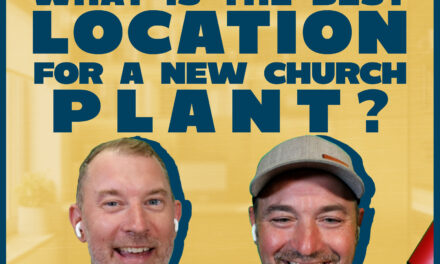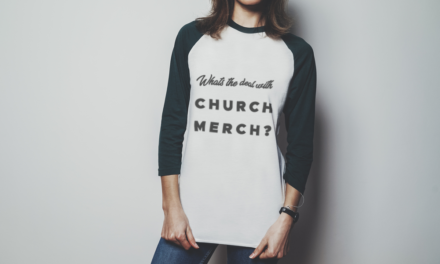In this episode of 101 Questions Church Planters Ask, host Danny Parmelee interviews Daniel Yang as they discuss this week’s topic, “Should I Consider Dual Affiliation?” Read the episode transcript below or listen at the link above.
Danny: Welcome back everyone to 101 Questions Church Planters Ask. I’m your host, Danny Parmelee, and today we have a special guest with us, Daniel Yang, who’s the executive director — is that your right title? Executive Director?
Daniel: Director. Director.
Danny: Director. I’ll call you Executive Director. I mean, you’re an executive. You do a lot, so.
Daniel: Maybe you know something that I don’t know. I don’t know.
Danny: — of the Send Institute. And today we’re going to be answering the question “Should I become dually affiliated or have multiple affiliations, multiple networks as a church plant?” And maybe kind of we’ll start off by just — well, actually, Daniel, why don’t you share just a little bit about yourself and kind of what you do and what the Send Institute is?
Daniel: Sure. Yeah. So I lead the Send Institute here — office at the Wheaton College Billy Graham Center. It’s a partnership between the North American Mission Board. So, speaking of affiliation, it’s a partnership between two entities, the North American Mission Board and the Wheaton College Billy Graham Center. Prior to that, I was a church planter in Toronto. We planted a church that planted a few other churches. I’m also currently doing a Ph.D. in Intercultural Studies here at Trinity. And really, man, I just love seeing people take their next steps in this journey of being a missionary for The Kingdom of God. And so that’s how I’m trying to live my life. And hope to inspire others to do the same. So, thanks for having me on, Danny.
Danny: Yeah. That’s great. Okay. So, let’s talk about this. Before we talk about dual affiliation, just affiliation in general. I think it’s becoming less and less common for church planters to just go totally independent. But I just — I honestly cannot see a reason to plant alone these days. I mean, there’s just multiple organizations. So I don’t know even if you have some stats for that, or even if you just say off the top of your head, if someone wanted to plant a church, what’s the number of organizations? Or how have you even seen that kind of change? From what year did you plant and if you’ve seen that kind of like grow over the years?
Daniel: Sure. Yeah. I think the decades where we saw a lot of non-denominational church planting probably was late ‘80s, ‘90s, and maybe early ‘00s. So about that 20-year span. Part of it is, prior to that, denomination still had a strong emphasis. They still had, you know, probably up until about the ‘60s or ‘70s, they had a really good reputation. You know, once you get to the ‘70s, ‘80s, that’s where the reputation for denomination started to decline a little bit. And that’s — especially mainline, because they started losing a lot of people. And then that’s when you get a lot of Gen X-ers that were former disgruntled youth pastors that, you know, planted their churches and then started all these other non-denominational networks like, you know, Acts 29 or ARC or whatever. A lot of these leaders that started these networks were probably loosely affiliated or non-denominationally planting and their networks began to reflect a little bit of their own background as well. That’s not to say that all the networks that were emerging in that time were not denominationally affiliated, but it’s interesting because later, the denomination started to learn from the multi or interdenominational networks and started copying — not copying, but learning and adapting some of the things that they saw from those networks. And they started developing like, denominationally, you know, affiliated networks. And so I think, really, right now I think you’re right. I don’t know if it has become, you know, as attractive to be that maverick, you know, out there on their own, whether it’s a, you know, male or female, you know, getting at it on their own. Because there’s just so much more resources and camaraderie that comes with planting with a network for a denomination. And I just think that over 40 years of church planting systems, they’ve gotten a lot better. And so, church planters feel more supported. And you know, I never knew this narrative, but I know when I talk to some of the church planters who planted in the ‘80s or ‘90s, I knew that for a lot of them, they planted it because — it wasn’t because church planting was a cool thing, it was because, in some ways, they couldn’t get hired by another church or they felt like that rogue missionary that didn’t fit in with their group.
Danny: Yeah. That’s great. You pointed out something that I think is really important, where you’re talking about denominationalism kind of — I don’t want to say dying out, but from a cultural perspective, congregation members used to be like, “Okay, I grew up Methodist, so if I move to another town, I’m going to look for a Methodist church. Or, if I grew up Baptist.” And when you started to have that decrease, then there was less of a reason for a church planter to say, “Hey, I’m affiliated with this group.” and so they kind of went alone, kind of did the whole, you know, maverick, cowboy type of thing. But now, there are just so many different resources that it goes beyond just kind of that name recognition. And most people that are looking for a church, they’re not looking for those denominational things. And a lot of the networks aren’t requiring you to, you know, say the name, that you’re a part of, even if they are actually denominationally kind of affiliated. So I agree with you. I just remember when I — so 2004, kind of starting that journey, there didn’t seem to be as many denominations. Now you go to Exponential [conference] and it’s literally halls of all of the different networks to be able to do that. So I actually want to talk a little bit about, you know, I hated the term as a lead pastor “church shopping”, but is there such a thing as “affiliation or network shopping”? I think I know the answer to that question, but I don’t know if you want to speak to that at all.
Daniel: Well, you know, let me just tell you, Danny, I just did a webinar last week with a guy named Len Tang. And Len leads the church planting initiative out of Fuller Seminary. And they just developed an online portal called plantermatch.org that is — these are his words, they made it to be the eHarmony of church planters. So, there is a thing. There is a thing as affiliation shopping or network shopping. I don’t think that’s necessarily a bad thing. I think it’s important for somebody who feels that God’s given them a dream, a missionary dream, to find the support network that, you know, best fits them in their philosophy of ministry. I do think some of the things that we do need to be careful of, and this is kind of harkening to what you were saying about church membership and, you know, church shopping is that I do think planters have — should have a sense of personal integrity to be transparent about all of the networks that they are in a relationship with. And by and large, I think most church planters do. You know, they’re very clear about, you know, this is my first affiliation and this is my secondary affiliation. I think, you know, some of the things that do concern me sometimes — and really it’s this. It boils down to a person who feels like, “This particular network can get me more money and so I’m going to be with them for three years.” That doesn’t happen a lot, but you and I know people that we could name, that it does happen. And so, those are the things that do kind of concern me. Because when you find a network or a denomination, it should in a way feel like this is a little bit of a family for you. It should feel like a family. You know, this is your first line of defense for the care for your family a lot of times. Especially if maybe you don’t necessarily have a sending church right out the gate. And then secondly is, there should be a mission and a history about that network or denomination that you feel proud to promote, that you feel like you are a part of, you know, the next line in the legacy of this movement. Because ultimately, it’s not about one particular church, one particular church planter. It really is the move of God that God is doing. And God moves in multiple streams, in multiple networks. And so a planter should feel pretty comfortable that they’re continuing on the legacy of that movement.
Danny: That’s great. One of the things that you said — because I just, I so agree with this, that if you’re a planter and you’re shopping from a very consumeristic “What can I get”, you will probably get yourself in some trouble. Especially if you’re shopping just for money. “Who’s going to give me the most money, the most grants?” And I remember even Emili and I, as we were discerning that, there was an organization that gave about double than what we were expected from Converge, you know, the group that we ended up planting with. She’s like, “I think I want to be part of that denomination.” Oh, hold on a second, here’s a few theological things. And the other thing is, you used the word “family”. Sometimes I use the word “tribe”. Both I think are really good. But encouraging church planters that — pick a tribe that you want to run with long-term. So again, not just who’s going to give me the most amount of money, the least amount that I need to give back to them over the next three years. But if you’re to kind of peer into the future, who’s the group of people that, “Yes, I want to be around this group of people.”? And not only “What can I get from them?” but “What can I give?” Are there going to be opportunities for you to have a platform? For you to be able to use your gift and abilities to kind of feed into the movement instead of just what are the different things that you can get from it. So the other thing that I want you to talk about a little bit that you said, is primary and secondary. Because we haven’t even really hit the question head-on. First of all, maybe I’ll just say this. I think it’s totally okay to be single-affiliated. There’s maybe even some advantage to that. So you have a group. Maybe you have a history with them. Maybe you have, you know, you’re just really in love with the mission and what they’re doing. And that’s where you want to put all of your eggs, in that basket. I think that is a great thing. But it leads us to the second question. Well, what if there are kind of two of them and I can’t really pick? And they’re kind of offering maybe some similar things? But you had mentioned primary and secondary. Speak to that a little bit more.
Daniel: Sure. So if I’m planting denominationally, I would typically consider my denomination as my primary affiliation. And the reason for that is, it’s just usually your denomination that is theologically aligned with what you’re affiliating with. They also probably provide in some ways the credentialing process that you need, you know, again, you may plant in a very autonomous fashion where you’re not ordained or you’re not even certified to be, you know, a clergy for tax purposes. But for most planters, you know, they are looking for a credential pathway, to be a pastor planter. And that usually is going to be probably a denomination or a denomination-like structure. And so, theology is a big part of that. We’re not going to be talking about money at that point. We’re just talking about like, “I feel like this is the movement that God has used to shape me theologically. To shape me in terms of tradition.” And so, you’re not going to be somebody who is planting a church that does immersion only, but then you want to plant with the PCA. Right? I mean, there is just a continuity between the tradition and then the expression of church that you have. So that’s what I would consider to be your primary affiliation. Because at the end of the day, for many, maybe not for everybody, but for many, this would be the agency that holds your credentialing. And I think that’s important. Because, you know, as much as what we’re doing is a spiritual kingdom-oriented endeavor, there [are] also legal responsibilities. And not every structure is like the Southern Baptist or Baptist structures. Many, many church plants still have a bit of a hierarchical structure that they have to work inside of. And then in terms of your secondary affiliation, I think that sometimes tends to be networks that are philosophically aligned. And so they might be a little more focused on, you know, missional churches. Or they may be a little bit focused on, you know, urban churches, or rural churches, for that matter. But you know that there’s an affinity base, there’s a philosophical commonality between what God’s called you to do and what that network is doing. And they feel a sense of accountability to you, but maybe not in the same way that a denomination would. I think what becomes almost difficult, you know, almost — very few situations would allow for a church plant to affiliate dually with two denominations. I know it happens, but it’s a very special arrangement at times. And those relationships are made very clear. And in some ways those denominations are probably pretty compatible in some ways. But largely, that second affiliation is probably a network of relationships and they’re probably not going to credential you. And then probably, you may in some ways give back to that network, but it’s probably not going to be at the same level or commitment that you would with your first affiliation.
Danny: Yeah. That’s great. I think even just some examples, so, you know, being part of Converge, especially when Acts 29 was new, we had a number of our church plants that were dual-affiliated in that way because, you know, a majority of their funding and their long-term commitments were all kind of connected to Converge as their primary. Acts 29 became kind of their secondary because there was exactly what you were saying, there was kind of that philosophical, kind of that “You know what? Hey, this is who we identify with. Yes, we wear plaid and smoke cigars and are reformed.” Okay. Maybe I joke a little bit too much there.
Daniel: That was the early 2000s.
Danny: Yes. That was the early 2000s.
Daniel: Yeah.
Danny: And also to that point, and this helps to kind of draw this point out, is that Acts 29 is functioning more like a denomination than they were before. And by that, I just mean the amount of structures in requirement. So it’s actually a little bit harder to do dual affiliate now — and again, just nothing wrong with that. I’m just saying that that’s how they’ve kind of grown and matured. And then you’ve got other examples and networks, like NewThing, where it’s like, yes, they want you to maybe have your primary and that they are secondary because they’re looking, you know, very specifically within like a city, a regional context to be able to do that. So I think that’s one of the great things for church planters, to really evaluate, to see what are some of those requirements, and at what point does it have a diminishing return to it. And that’s where I’ve seen some planters get in trouble. When they, you know, dual or triple-affiliate and each group is expecting something back. So you had mentioned giving. Or, “We expect you to be at these monthly meetings. We expect you to come to these conferences.” And pretty soon the church planter is just sending money at conferences and at pastor meetings all week long, and they’re not even doing ministry more. They’re just trying to keep all these relationships kind of going. So that’s where they just have to kind of have some evaluation if there’s diminishing return. The other thing is having networks, or having the church planter make sure — and you had alluded to this earlier on, that there’s communication between the primary and the secondary. I don’t know if you want to speak to that a little bit or what that might look like? Or why that is so helpful?
Daniel: Sure. Yeah. And I think in some ways, this is primarily the church planter’s responsibility, to be clear. This is in some ways a matter of integrity, that if you’re planting with a denomination that — first and foremost, your commitment to them should probably be at a level that you and they are both comfortable with. So if either one of you have unmet expectations or unrealistic expectations, then I think that could be difficult. And then, I think in some ways also, you have to be able to verbalize to your denomination your commitment level to the secondary network. Because, you know, all denominations, we know for the most part that their planters may affiliate with secondary networks. So it’s not a matter of “if”, it’s just a matter of “how” is that happening. And for the most part, most denominational leaders, I mean, you work for a denomination, I work for a denomination, we’re all for that. We really celebrate that because we know that no one entity can be all things to everyone. But at the same time, you know, you just have a clear set of expectations so that you know — number one, not to do too much to overwhelm the church planter, but also, number two, you do also — there is a sense that you want church planters to be able to give back, you know, not necessarily just financially, but time, emotional, coaching-wise back into their own family. And that’s just, you know, in some ways, that’s the oikos system that the church is built around. And that’s not too different from the denomination as well. But I’ll tell you, probably, Danny, the thing that’s probably most important in terms of church planter transparency, I think ultimately, at the end of the day, it has to come down to a genuine sense which you feel like, God has actually led you into a relationship. I don’t want to hyper-spiritualize it, I don’t want to make it, you know, sound so mystical, but I know planters who maybe are less prayerful about these decisions. It’s a very pragmatic transaction. And I do think that in some ways, God will call you to affiliate or to partner with certain entities, and you should feel a level of conviction. And I think as long as you feel that level of conviction then you can truthfully talk to, you know, all of the entities in a way that is, you know, with a clarity of conscience and integrity. And I think that it’s important for you to know what it is that God has called you to and why, why is it that tribe, so that you don’t end up being, you know, three, or four years down the road and having questions of, you know, “Why did I make that decision?”. So I think that’s really important. To feel the call of God in your life.
Danny: That’s absolutely amazing. I love that. Daniel, if people want to read some more of your stuff, I know you got some blog, why don’t you just share how people can find you and find some of your stuff that you have written?
Daniel: Sure. Yeah. I mean, all of my stuff that we’re writing and research is at sendinstitute.org. Ed and I do a podcast called Stetzer Leadership, at stetzerleadership.com. And that’s something that we started in the midst of Covid. And then Peyton Jones also, he and I have a podcast at Exponential called Frontlines. So, yeah, either of those three outlets.
Danny: Awesome. Well, Daniel, thank you so much for being on the show today. And thank you, everybody, for listening. And remember, if you have questions, you can head over to the blog at churchplantersask.com. And until next time, keep asking those questions.
Daniel Yang is the Director of the Send Institute, leading and overseeing all of its initiatives. Prior to directing the institute, he planted a church in Toronto where he also helped recruit, assess, and train church planters through the Send Network and the Release Initiative. Daniel has served on various church staffs including Northwood Church, led by Bob Roberts Jr., where he was trained as a church planter and involved in global and multi-faith engagement. Prior to church planting, Daniel was an engineer for eight years. He earned an M.Div. from Southwestern Baptist Theological Seminary, a B.S. in Computer Science from the University of Michigan, and is currently a Ph.D. Intercultural Studies student at Trinity Evangelical Divinity School.





